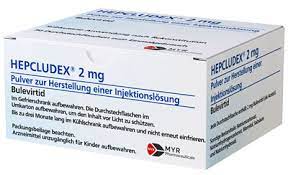FOSTER CITY, Calif.– Gilead Sciences, Inc. (Nasdaq: GILD) today announced Week 48 results from the Pivotal Phase 3 clinical trial evaluating the first-in-class entry inhibitor Hepcludex® (bulevirtide) for the treatment of chronic hepatitis delta virus (HDV) infection. Findings from the study underscore the efficacy and safety of bulevirtide for the treatment of chronic HDV and are being presented today in the International Liver Congress™ (ILC) 2022 Official Press Program. In addition, Week 48 data demonstrating the positive impact of bulevirtide on patient-reported outcomes (PROs) in people living with chronic HDV will also be presented. Together, these data reinforce the clinical utility of bulevirtide as monotherapy for the treatment of chronic HDV. There are currently no other approved treatment options for HDV and people living with HDV typically have a poor prognosis.
“As the most severe form of viral hepatitis, HDV presents a significant disease burden with high healthcare-related costs and until recently, no approved treatment options,” said Heiner Wedemeyer, MD, Director, Clinic for Gastroenterology, Hepatology and Endocrinology at Hannover Medical School, and principal investigator of the study. “These results presented at ILC 2022 not only highlight the important clinical role that bulevirtide has to play as a safe and effective treatment option for chronic HDV, but critically also demonstrate that with prolonged treatment, we can achieve higher response rates so we can better manage this rare, life-threatening disease in more people.”
At Week 48, study participants treated with bulevirtide monotherapy at 2 mg or 10 mg once daily achieved a significantly greater combined virological and biochemical response (45% and 48%, respectively) when compared to participants who had not received antiviral treatment at this stage of the study (2%). Combined response was defined as undetectable HDV RNA or a decrease by 2 log10 IU/mL from baseline and ALT normalization. Similarly, when the Week 48 data is considered alongside the integrated Week 24 analyses of the ongoing Phase 2 studies (MYR202 and MYR203) and the interim Week 24 Phase 3 MYR301 data presented at ILC 2021, combined response rates of bulevirtide increased from Week 24 to Week 48, highlighting an improved response of bulevirtide with prolonged treatment.
The safety profile of bulevirtide at Week 48 is consistent with prior reports, with no participants having an adverse event (AE) leading to discontinuation of bulevirtide and no serious AEs attributed to bulevirtide treatment. The safety profile at both Week 24 and again at Week 48 reassert the safety and tolerability profile of bulevirtide, which is an important factor for people living with chronic HDV.
“The consequences of living with a serious and chronic condition like HDV can have a profound impact on the individual’s quality of life, affecting the physical and mental well-being of people living with HDV,” said Anu Osinusi, Vice President, Clinical Research for Hepatitis, Respiratory and Emerging Viruses at Gilead. “What we now see is that treatment with bulevirtide not only improves clinical measures associated with viral control but can significantly improve, and maintain, a range of quality-of-life markers in people living with HDV, ultimately improving the overall management of the condition.”
In an oral presentation, Gilead will also share an exploratory analysis of the Week 48 data from the Phase 3 MYR301 study, evaluating the impact of bulevirtide (2 mg once daily) on PROs in people living with chronic HDV. Participants treated with bulevirtide 2 mg (n=49) showed significant improvements from baseline at 48 weeks in almost all assessed health-related quality-of-life domains of the Hepatitis Quality of Life questionnaire. Participants in the control group (n=51) remained largely unchanged, apart from significant improvements in health distress and hepatitis-specific health distress. Of note, participants receiving bulevirtide 2 mg reported significant improvements in performance of daily activities related to hepatitis, emotional impact of hepatitis and improvement in work compared with controls.
Bulevirtide was granted Conditional Marketing Authorization by the European Commission and is an investigational agent in the U.S. and outside of the European Economic Area. In these regions, health authorities have not established the safety and efficacy of bulevirtide. A Biologics License Application (BLA) was submitted in Q4 2021 to the U.S. Food and Drug Administration (FDA) for bulevirtide for injection (2 mg) to treat adults with HDV and compensated liver disease. This Phase 3 data is included in the filing of bulevirtide to the FDA. Bulevirtide has been granted Breakthrough Therapy and Orphan Drug designations by the FDA. In 2020 bulevirtide 2 mg was granted Conditional Marketing Authorization by the European Commission and PRIority MEdicines (PRIME) scheme eligibility by the European Medicines Agency as the first approved treatment in Europe for adults with chronic HDV and compensated liver disease.


